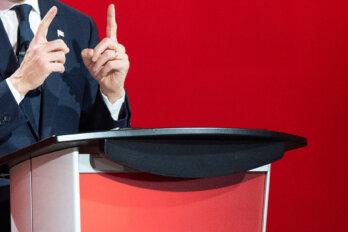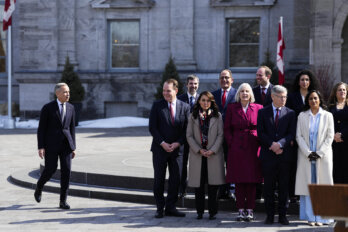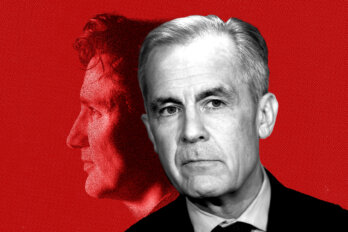It was supposed to be so predictable, no matter how many spins of the wheel it took to churn out the newly minted leader of Her Majesty’s Loyal Opposition. Despite a baker’s dozen of names on the ballot for the Conservative leadership, only a few ever had a real chance at the job—a chance fattened by the exit of Kevin O’Leary, whose disingenuous theatrics on television managed to resonate with Conservatives who were likely used to, and content with, disingenuous theatrics in parliament.
The choices were many, but it came down to just a few major questions. Who can most effectively throw shade on the sunny ways of Justin Trudeau? Whose smile is the least plastic? Whose suit is the least empty? Whose family portrait would look most at home as a stock image in a picture frame sold on the shelves at a dollar store? Who is the best purveyor of the ill-defined Canadian Dream, now that the well-defined American Dream has morphed into the world’s nightmare?
One stand-out detail about frontrunner Maxime Bernier’s campaign was that it was mottoless. Most other contenders picked benign sets of buzzwords to bolster their credibility: Brad Trost, according to Brad Trost, was “100% Conservative.” Winner Andrew Scheer, who seems to be a diet version of Stephen Harper, is a self-proclaimed “Real Conservative” and “Real Leader” (as opposed to the Fake Conservatives and Fake Leaders in the other camps, presumably.) Lisa Raitt ran under the simple banner of “Victory in 2019.” Kellie Leitch’s campaign, like Bernier’s, went on without a motto, simply branding the candidate “Kellie.” Even as she became a lightning rod for criticism on par with O’Leary, she never wavered, boldly stating on her website that she would create “more freedom and more prosperity by promoting a unified Canadian identity that is based on historic Canadian values.”
She continued, seemingly unaware of the irony, to promote unity while dividing people on the basis of her definition of acceptable values:
“Many in the media, the out-of-touch elites, most of the Trudeau Liberals, and even some Conservatives, including all of the other candidates in this leadership race have come out against my policy that would require all immigrants, refugees, and visitors to Canada to have a face-to-face interview with a trained immigration officer. We must screen for Canadian values.”
Leitch touted herself as the lone protector of Canada from marauding hordes of foreign invaders (visible only to her, and perhaps to Rebel personality Faith Goldy). But the dream of a prosperous and homogenous Canada will have to wait.
If Leitch’s campaign had an opposite, Andrew Saxton out of North Vancouver might come closest. While he ran on the promise of “Protecting the Canadian Dream,” he was also aware of just how boring he is, and wore the word like a badge of honour. A dedicated policy wonk, he took thinly veiled shots at the flashy, raucous campaigns of O’Leary and Leitch: “Boring? You bet. But solid and detailed economic plans are,” he proclaimed. “I don’t have pretty hair or a TV show. I’m not making outrageous comments or crazy promises. Instead, I have over 30 years of experience in finance, and a whole lot of boring, detailed policies. Government was never supposed to be show business. Let’s get back to basics.”
Saxton likely knew he had little chance in the race, but just by entering, it boosted his name recognition. And by positioning himself opposite to the fringes courted by O’Leary and Leitch, he’s set himself up as a sensible go-to for a position above his former posts as parliamentary secretary in both treasury and finance.
While Saxton established himself as the boring candidate, others vied for the mantle of blandness. And as the party wrestles with factions still reeling from policy defeats on abortion, same-sex marriage, and marijuana legalization, a bland, uncontroversial, and experienced leader has its attractions. Chris Alexander, running on the motto “New Canada,” touted his foreign service record in both Russia and Afghanistan, as well as his stint with the UN. Meanwhile, Steven Blaney’s motto “Canada First” was followed by three oft-repeated words throughout the campaign, “Security. Stability. Prosperity.” But both men’s generic campaigns were beset by the reality of being relative unknowns. The same could be said about Rick “Let’s get to work!” Peterson and Pierre Lemieux, whose three word motto was similar to Blaney’s: “Democracy. Family. Security.” Third-place finisher Erin O’Toole whittled his motto down to two words: “Proven. Ready.” (The party proved itself unready for him to lead.)
The other unknown, Deepak Obrhai, who touted the coming “DeepakAGE,” decried his lack of coverage and felt his voice was unfairly ignored among his nearly all white opponents.
“From the very beginning, my voice has been ignored by the bulk of the media to the point that many people still do not even know I am running. This in itself illustrates a growing lack of respect for anyone wishing to participate in our democracy, which should raise concern across the board,” he wrote in the Huffington Post.
In a race that lacked diversity, and in an age where diversity is taking centre-stage in the public conversation, Obrhai’s voice was as important as any—and ignored by and large.
That leaves outlier Michael Chong, the lone supporter of a carbon tax in the bunch, which made him an instant pariah among the field. After the final count, the party decided it didn’t buy into his motto: “Opportunity. For a Better Canada.”
Campaigns offer an ideal platform for candidates to showcase their way with words, but making a bid to govern—and winning the chance to do so—demands a lot more than just empty sloganeering. Leadership races present parties with the opportunity for renewal and invigoration with new blood, new ideas, and to shed dead skin and excess baggage. Scheer’s blood type has been flowing through the party’s veins for years: his ideas play upon familiar conservative tropes of small government, low taxes, and personal freedom. At least Bernier represented a change in direction for the party to its Libertarian fringe, but now we’ll never know how such a shift would play out in an election. With the party’s middle-of-the-road choice of Scheer, Conservatives may have missed an opportunity to explore a different path and position themselves on an avenue toward victory in 2019. As of now, they’re in need of considerable momentum to win a game of chicken with Trudeau‘s Liberals. Whether Scheer has the audacity to not swerve first remains to be seen.




